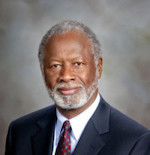A little more than three years ago, J.D. Vance was just an author and conservative commentator. Now he might be next in line for the White House. It’s a dizzying political ascent for the 39-year-old man from Middletown, Ohio.
Presumptive Republican Party presidential nominee Donald Trump announced Monday during the first day of the Republican National Convention that he has chosen Vance as his running mate in the 2024 Election.
His 2016 memoir Hillbilly Elegy put him on the national stage as many were searching for an explanation to the rise of Donald Trump. At the time, Vance himself was extremely critical of the incoming president, but by the time he was running for office in 2022, Vance had reversed his thinking. Instead of “cultural heroin,” he argued Trump was the “greatest president in my lifetime.”
Vance’s embrace of Trump helped him secure the former president’s endorsement in his U.S. Senate race, and since taking office, Vance has been one of Trump’s most consistent defenders. On cable news and Sunday talk shows, the Yale law grad has shown a knack for smoothing the sharp edges off of Trump’s latest pronouncements without walking back his point. As the Trump campaign works to extend beyond its conservative base, Vance’s skills as a communicator and translator — presenting a more palatable version of the nominee’s message — could help appeal to undecided voters.
Still, there’s plenty in Vance’s own messaging that could turn some voters off. As a U.S. Senate candidate he leaned heavily into anti-immigrant rhetoric. On the campaign trail and in office, he has stridently opposed ongoing support for Ukraine. That stance is particularly notable given Ohio’s substantial Ukrainian community and Vance’s predecessor, U.S. Sen. Rob Portman co-founded and chaired the Senate Ukraine caucus. Critics argue Vance’s statements about the war mirror rhetoric coming out of the Kremlin.
On the other hand, Vance has signed on to several bipartisan pieces of legislation. In addition to co-sponsoring rail safety and unfair trade legislation with U.S. Sen. Sherrod Brown, D-OH, Vance has backed U.S. Sen. Elizabeth Warren’s, D-MA, bill to claw back bonuses from executives at failed banks, and U.S. Sen. Sheldon Whitehouse’s, D-RI, bill that would eliminate a lucrative tax exemption for larger mergers.
Vance has also praised FTC Chairwoman Lina Khan for taking a more critical view of business consolidation. That more aggressive posture has earned Khan the ire of traditional GOP allies like the U.S. Chamber of Commerce.
What does he bring to the ticket?
When a presidential nominee selects a running mate, they often attempt to answer a perceived shortcoming. The vice-presidential pick might come from an important state or region. Maybe they have strong connections with a particular interest group or represent a wing of the party. Perhaps they bring greater governing experience to the table.
Ohio State political science professor emeritus Paul Beck argued Vance’s appeal for the ticket certainly isn’t geographic.
“Well, I think one thing Vance doesn’t bring is votes in Ohio that Trump would need,” Beck said. “He doesn’t need them.”
In 2016 and 2020, Trump won Ohio handily. In 2022, as Republicans nationwide underperformed, Vance and every other statewide Republican candidate won their races in Ohio.
Beck contrasted Vance with former Vice President Mike Pence, who helped bring Christian evangelicals into the fold. Vance doesn’t have a similar affinity group to add, but Beck suggested he might help solidify support among one of Trump’s strongest groups of supporters — white working-class voters. Vance speaks their language, Beck argued, when it comes to trade and offshoring.
“It could well be that he brings that group or at least solidifies that group in the Trump coalition,” Beck said, but allowed, “I don’t think Trump needs, necessarily, somebody who is going to strongly appeal to that particular part of his base. On the other hand he doesn’t want someone on his ticket, I would think, who would be opposed.”
Instead, Beck emphasized Vance’s ability as a communicator. “He certainly has emerged as one of the most forceful and articulate defenders of a lot of conservative policy,” Beck argued. And as part of the ticket, he added, Vance could be an asset “downplay(ing) some of the major Democratic criticisms of Trump and deflect(ing) them in a way that is plausible.”
Personal perspective
Dan Driscoll first met Vance as part of a veteran’s group at Yale and described him a reassuring voice for a “scared, humbled, self-conscious” first year law student. In an interview Driscoll said he’s “thrilled for a friend I have a ton of respect for and our country to get an amazing leader.”
Since graduating, Driscoll has settled in North Carolina. In 2020 he ran for the Republican nomination for the congressional seat vacated by former Trump chief of staff Mark Meadows. He lost in a crowded primary to the eventual winner, former Rep. Madison Cawthorn.
Driscoll argued Vance’s run of success from a book, to a movie, to a venture capital fund — “most people, one of those would be an amazing lifetime achievement” — is no accident. He described the senator as “one of the single hardest workers” he’s ever met.
And like Beck, he pointed to Vance’s communication skills as a kind of a “superpower,” but insisted it works because he’s saying what he believes.
“My true genuine perspective is that he just wants to make a difference for a set of the population that seems to have been pretty overlooked since the 80’s or 90’s,” Driscoll said.
He argued Vance is skeptical of elite political consensus on issues like trade because it has contributed the hollowing out of working-class communities like Middletown where he grew up. It was a familiar part of Vance’s stump speech throughout his U.S. Senate campaign. Driscoll brought up examples of Vance working with some of the most liberal lawmakers in the Senate, and argued he wouldn’t do so unless they shared concerns about policies impact those communities.
“Even if what he’s saying doesn’t fit in these clean boxes of the left or the right, if he believes it, he will say it,” Driscoll argued. “And that’s really compelling to a lot of people, I think.”
Ohio Republicans applaud
Shortly after President Trump’s announcement came a wave of positive reaction from Ohio politicos.
Gov. Mike DeWine, who will be tasked with finding a replacement if Republicans retake the White House, congratulated Vance and praised his “unique life story (which) will resonate with Republicans and Independent voters across the country.”
DeWine has no shortage of options to fill the vacancy created by a Vance Vice Presidency, but whomever he settles on would face an election in 2026 to complete the remainder of Vance’s unexpired term.
DeWine added that “J.D. will also bring a new generational perspective to the ticket,” and that his experience growing up poor in Middletown, Ohio will help him relate “to the many Americans who are struggling right now to make ends meet.”
Republican U.S. Senate nominee Bernie Moreno has been an enthusiastic supporter of Vance, and the feeling is mutual. Vance endorsed Moreno for the U.S. Senate more than a year ago in hopes of avoiding a messy primary, and last November, he campaigned with Moreno outside Columbus — urging the crowd to “send me reinforcements.”
“President Trump made a brilliant selection in Senator J.D. Vance,” Moreno said in a statement.
Moreno described Vance as a “dynamic, visionary leader” and the “perfect messenger” for Trump’s agenda.
“He will fight with President Trump for our middle class, secure our border, and unleash American energy,” Moreno continued. I am proud to call J.D. a friend and I look forward to working with him to fire Joe Biden, Kamala Harris, and Sherrod Brown.”
Several of the Ohio politicians who could be in the running if Vance’s seat opens up poured praise on the selection as well. On social media, State Treasurer Robert Sprague said “once again, President Trump hits it out of the park.” In a press release Attorney General Dave Yost called Vance a “perfect pick.”
“Tough, smart and high-energy,” Yost went on. “He knows what it’s like to have to fight, what it’s like to win, and what it’s like to serve.”
Both men are eyeing the governor’s mansion in 2026, and speculation has begun that DeWine might name a gubernatorial contender as way to create a less volatile GOP primary. Lt. Gov. Jon Husted is laying the groundwork to run for governor as well.
Two recent U.S. Senate hopefuls congratulated Vance on his selection as well. State Sen. Matt Dolan, who DeWine endorsed in this year’s GOP primary, described the pick as “great news for Ohio and America. We are in need of new, results-driven leadership in Washington, DC.”
Secretary of State Frank LaRose praised Vance as “an excellent choice,” who will “serve honorably.”
“J.D. Vance is a patriot, a thought leader, and a fighter for America’s forgotten working class,” LaRose said.
Ohio Democrats criticize Vance’s ‘political shapeshifting’
In a nod to Vance’s previous comments against Trump, Ohio Democratic Party Chair Elizabeth Walters released a statement after the selection pointing to his “political shapeshifting.”
“J.D. Vance is an out-of-touch millionaire who launched his political career by taking advantage of Ohio’s opioid crisis and has spent his time in the Senate humiliating himself in the service of a convicted felon instead of working to improve the quality of life for Ohioans,” Walters said. “His support for a national abortion ban and his twisted belief that women should stay in violent marriages for the benefit of their children exemplifies his dangerous extremism. He’s not just wrong for Ohio, he’s wrong for the country.”
• • •• • •
This story is provided by Ohio Capital Journal, a part of States Newsroom, a national 501(c)(3) nonprofit. See the original story here.




















